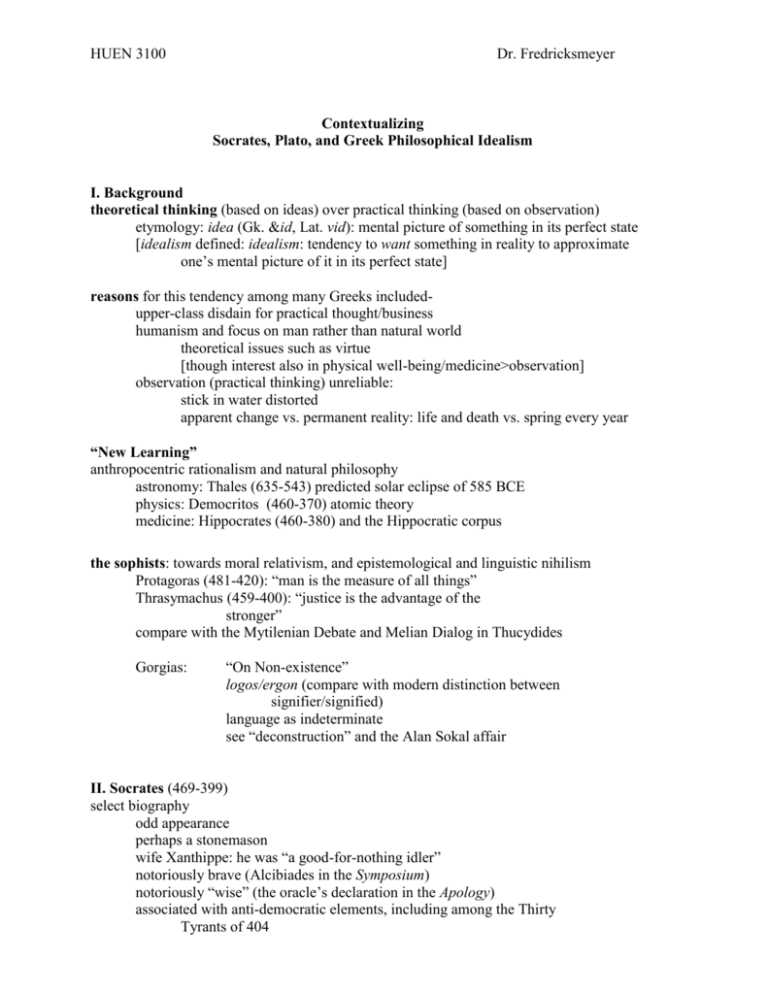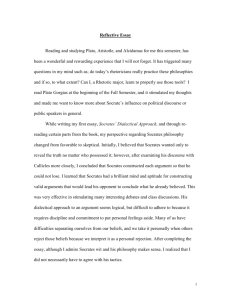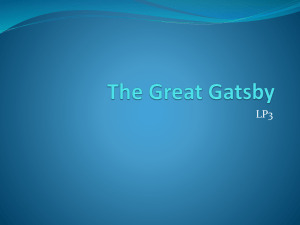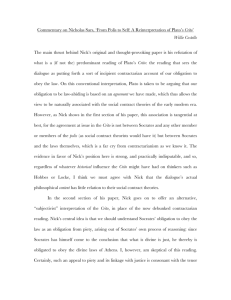Classical Idealism
advertisement

HUEN 3100 Dr. Fredricksmeyer Contextualizing Socrates, Plato, and Greek Philosophical Idealism I. Background theoretical thinking (based on ideas) over practical thinking (based on observation) etymology: idea (Gk. &id, Lat. vid): mental picture of something in its perfect state [idealism defined: idealism: tendency to want something in reality to approximate one’s mental picture of it in its perfect state] reasons for this tendency among many Greeks includedupper-class disdain for practical thought/business humanism and focus on man rather than natural world theoretical issues such as virtue [though interest also in physical well-being/medicine>observation] observation (practical thinking) unreliable: stick in water distorted apparent change vs. permanent reality: life and death vs. spring every year “New Learning” anthropocentric rationalism and natural philosophy astronomy: Thales (635-543) predicted solar eclipse of 585 BCE physics: Democritos (460-370) atomic theory medicine: Hippocrates (460-380) and the Hippocratic corpus the sophists: towards moral relativism, and epistemological and linguistic nihilism Protagoras (481-420): “man is the measure of all things” Thrasymachus (459-400): “justice is the advantage of the stronger” compare with the Mytilenian Debate and Melian Dialog in Thucydides Gorgias: “On Non-existence” logos/ergon (compare with modern distinction between signifier/signified) language as indeterminate see “deconstruction” and the Alan Sokal affair II. Socrates (469-399) select biography odd appearance perhaps a stonemason wife Xanthippe: he was “a good-for-nothing idler” notoriously brave (Alcibiades in the Symposium) notoriously “wise” (the oracle’s declaration in the Apology) associated with anti-democratic elements, including among the Thirty Tyrants of 404 Socrates' trial and death as characterized in: Euthyphro (the charges) Apology (Socrates defense against the charges) Crito (refusal to escape prison, and the social contract theory) Phaedo (the death of Socrates by hemlock): final words to Crito, “I owe a cock to Asclepius; will you remember to pay the debt?” III. Plato (424-347): select biography student of Socrates (see also Xenophon and others) wealthy family (etymology of the term “scholar”) founded the “Academy” that operated until AD 529! along with Aristotle, laid foundations of western philosophy (more below), including Stoicism (see Epictetus and Stockdale) Plato and Platonic dialogues: philosophical dialectic with characterization and humor, many featuring Socrates the "Horsefly" (Cahill: “the Stingray”) problems of interpretation dating of the dialogues voice of Socrates vs. that of Plato recent trends in interpretation: “new Platonism” Platonic aporia Platonic idealism in the Republic the Cave Platonic theory of forms/idealism unreliability of observation the perfect state/utopia: social stratification Guardians/Philosopher King (wisdom) austerity: no money, property, family, or marriage; eugenic breeding Soldiers (bravery) Producers (productive-acquisitive urge) elimination of poetry, art, music IV. Aristotle Plato's disciple the Lyceum materialism: the "form" is inherent in objects; they are informed V. Plato's Legacy Neo-Platonism and St. Augustine reason and Christianity Neo-Platonism, Humanism, and the Renaissance Cosimo de Medici Ficino Neo-Platonic Academy at Florence philosophyAlfred N. Whitehead: western philosophy as footnotes to Plato recent vote of academic philosophers Plato and Aristotle establish debate between rationalism and empiricism that continued arguably until Kant Christianityspiritual world more real than the world of matter religion and politics: idealism to ideologyideology: tendency to force something to approximate one’s mental picture of it in its perfect state dangerous elements of The Republic class stratification rule by elite that is closely associated with a military total subordination of the individual to the state censorship eugenics from the Platonic forms to dystopia/ideologies: Karl Popper, The Open Society and its Enemies (1938) failed utopias on the left and rightMarxism/Stalinist Russia (left) Maoist China (left) Nazism (right) part of problem: Platonic equation of knowledge and virtue (vs. Phaedra in Euripides' Hippolytus)










